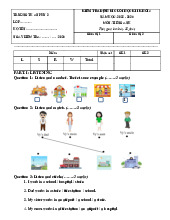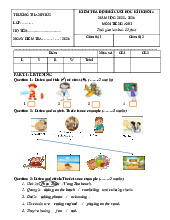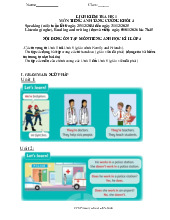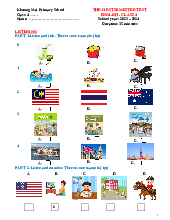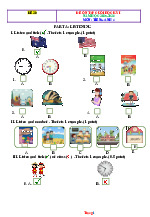





Preview text:
TRƯỜNG TIỂU HỌC……..
ĐỀ CƯƠNG ÔN TẬP HỌC KÌ I MÔN TIẾNG ANH - LỚP 4 Năm học 2023 - 2024 I. NỘI DUNG KIỂM TRA
1. Đề bao gồm bốn kĩ năng: Nghe; Nói; Đọc; Viết
2. Nội dung: trắc nghiệm và tự luận
3. Thời gian làm bài: 35 phút
4. Hình thức kiểm tra: Kiểm tra tập trung theo lớp
5. Thời gian ôn tập: Tuần 15 6. Thời gian thi: Tuần 16 II.
KIẾN THỨC TRỌNG TÂM: Các từ vựng và cấu trúc đã học UNIT STARTER: BACK TO SCHOOL 1. Từ vựng:
- good morning, good afternoon, good evening
- hold up your drawing, tidy up, put up your hand, put down your hand,
take out your pencil, put away your pencil - numbers: 11 – 20 - numbers: 21 - 100 2. Cấu trúc câu:
- How are you today? I’m very well.
- What can you see? I can see thirteen pencils.
- Twelve plus fifteen is twenty-seven 3. Phát âm:
/l/; /m/; /n/: look; mum; number UNIT 1: TIME FOR SCHOOL 1. Từ vựng: TIME SCHOOL THINGS MONTH SEASONS seven colouring January Spring o’clock pencil February Summer compass March Autumn seven notebook April Winter fifteen marker May seven thirty dictionary June seven whiteboard July forty-five August seven fifty September October November December 2. Cấu trúc câu:
- What time is it? – It’s 7.30.
- What is your favourite school thing? – I love the marker. I like writing.
- When is your birthday? – My birthday is in June.
*What time is it? – It’s (time). (dùng để hỏi và trả lời về thời gian)
*What is your favourite school thing? – I love the (thing). I like (doing something).
(dùng để hỏi và trả lời về đồ vật trong lớp và hoạt động mình yêu thích)
*When is your birthday? – My birthday is in (month). (dùng để hỏi và trả lời về
tháng sinh nhật của mình) 3. Phát âm: /uː/: school /ʊ/: notebook UNIT 2: IT’S A HAPPY DAY! 1. Từ vựng: get up prepare have breakfast morning go to school afternoon have lunch evening have art lessons night get dressed noon eat a snack paintbrushes do laundry crayons wake up paints take a bath routine have dinner write a letter go to bed do crosswords go to school water flowers have lessons paint flowers painting lessons tennis lesson brush teeth timetable early 2. Cấu trúc câu: I get up at 7 o’clock.
We don’t go to school at night.
Do you do homework at 8 o’clock? - Yes, I do.
When do you have breakfast? - I have breakfast in the morning.
What do you do in the evening? - I watch TV with my family.
What are you wearing? - I’m wearing trousers. Grammar Help:
* I (do something) at + (time).
(Dùng để nói mình làm gì vào lúc mấy giờ.)
* I don’t (do something) at + (time)/ in the morning/afternoon/evening.
(Dùng để nói mình không làm gì vào khoảng thời gian nào đó.)
* Do you (do something) at + (time)? - Yes, I do. / No, I don’t.
(Dùng để hỏi đáp về một thói quen diễn ra tại khung giờ nào đó.) * When do you (do something)?
- I (do something) in the morning/afternoon/evening.
(Dùng để hỏi đáp về thời gian mình làm một việc gì đó (vào buổi sáng, chiều hay tối)).
*What do you do in the morning/afternoon/evening?
- I (do something) in the morning/afternoon/evening.
(Dùng để hỏi ai đó làm những hoạt động gì vào một buổi trong ngày.) * What are you wearing? - I’m wearing (something)
(Dùng để hỏi về quần áo một người đang mặc). 3. Phát âm: /ə/ and /ɜː/
/ə/: dinner, father, brother, afternoon, winter
/ɜː/: homework, word game, T-shirt, crosswords UNIT 3: FREE TIME ACTIVITIES 1. Từ vựng: watch TV go to sleep listen to music do homework read books vovinam play the piano plant trees play video games clean the floor free time wash the car play badminton do housework play basketball spend time play chess tidy up roller skate feed skateboard outside do karate inside go to the cinema busy go to restaurants hungry 2. Cấu trúc câu:
In my free time, I watch TV and play the piano.
Kim doesn’t play video games.
Does your brother roller skate on Tuesday? - Yes, he does.
What does your father do on Monday? - He washes his car on Monday. Grammar Help:
* In my free time, I (do something).
(Dùng để diễn tả một hoạt động mình thường làm trong thời gian rảnh.)
* I don’t (do something) in my free time.
(Dùng để diễn tả một hoạt động mình không làm trong thời gian rảnh.)
* Do you (do something) on (day)? - Yes, I do. / No, I don’t.
(Dùng để hỏi đáp xem ai đó có làm một hoạt động nào vào một ngày trong tuần hay không.) * What do you do on (day)? - I (do something) on (day).
(Dùng để hỏi đáp xem ai đó làm gì vào một ngày trong tuần.)
* S + like(s)/love(s) doing something
(Dùng để diễn tả sở thích.) 3. Phát âm: /r/: read a book /w/: watch TV /ng/: sing a song UNIT 4: AT THE ZOO 1. Từ vựng: monkey coconut water tiger burger hippo kiwi giraffe grapes zebra mango juice elephant ice lolly crocodile penguin eagle kangaroo 2. Cấu trúc câu: *What does it look like?
It's big and tall. It's got a long neck.
(Dùng để hỏi đáp đặc điểm của các loài động vật.) *What do elephants often eat?
Elephants often eat fruit and plants. They sometimes eat flowers. They never eat meat.
(Dùng để hỏi đáp xem đặc điểm về khoa học của các loài động vật ví dụ như voi.)
* What would you like to eat, grapes or mangos? Grapes, please. Would you like…?
(Dùng để hỏi đáp về sở thích hoặc mởi ai đó đó đồ ăn thức uống gì một cách rất
lịch sự và cách trả lời.) 3. Phát âm: /z/: zoo /s/: television /g/: giraffe III. BÀI TẬP
Bao gồm các HANDOUT từ 1 đến 6 cùng file nghe đính kèm trong file.
